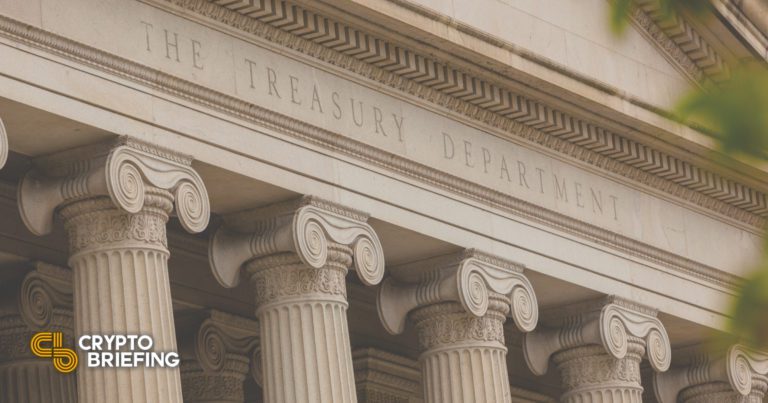
Key Takeaways
- Blockchain miners and validators will not be considered “brokers” for crypto tax reporting, the Treasury has confirmed.
- The Treasury stated that it will exempt “ancillary parties” lacking useful tax information.
- The definition of a cryptocurrency “broker” has been a source of concern since the Infrastructure Bill was introduced last year.
Share this article
The U.S. Treasury Department has clarified that miners, validators, and other crypto users such as token stakers, wallet operators, and developers will not be classified as crypto “brokers” under tax reporting rules.
Treasury Department Gives Clarity on “Broker” Definition
The U.S. Treasury Department has cleared up the uncertainty surrounding the definition of a cryptocurrency “broker” in the Infrastructure Bill.
The bill states that cryptocurrency brokers will have to report transactions worth a value of $10,000 or more to the Internal Revenue Service from January 2023.
On Friday, the Treasury, which oversees the IRS, issued a statement confirming that a cryptocurrency “broker” does not include miners, validators, and other participants that do not have access to users’ data. In a letter dated Feb. 11, 2022, Yonathan C. Davidson, Assistant Secretary of the Treasury Department, wrote to Senator Rob Portman to say that “ancillary parties who cannot get access to information that is useful to the IRS are not intended to be captured by the reporting requirements for brokers.” Portman reshared the letter in a tweet early Saturday.
Appreciate the Treasury Department affirming that crypto miners, stakers and those who sell hardware and software for wallets are not subject to tax reporting obligations.
As I have said from the start, this requirement only applies to brokers. pic.twitter.com/k5l6kDs4iA
— Rob Portman (@senrobportman) February 12, 2022
Since its introduction last year, the Infrastructure Bill has sparked fears across the crypto sector. The concerns mainly stem from the broad definition of a “broker,” which refers to parties that engage in “effectuating transfers” of cryptocurrencies.
It was speculated that the definition may extend to miners, validators, token stakers, and DeFi developers. These groups do not collect user data for tax reporting. If they were defined as a broker, it would be virtually impossible for them to comply with tax reporting rules.
Concerns over what the tax reporting rules could mean for the crypto sector led to lobbying efforts from both industry stakeholders and U.S. senators, including house representatives like Rob Portman and Patrick McHenry, who appealed to the Treasury to amend the broker definition to exclude miners and validators.
With the latest update from the Treasury, it has become clear that the broker term will only apply to crypto exchanges that have access to users’ transaction data. The letter from Davidson also stated that the Treasury will consider “the extent to which other parties in the digital asset market, such as centralized exchanges and those often described as decentralized exchanges and peer-to-peer exchanges, should be treated as brokers.”
Bloomberg reported that the Treasury will issue regulations to clarify the broker definition.
Share this article
This article first appeared at Crypto Briefing